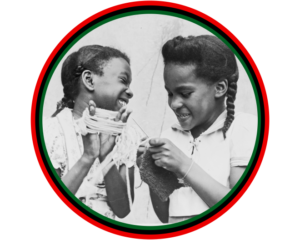What Great Things Conferences Bring: Global Black Girlhood and the Fellowship/Scholarship of Black Women
 This past weekend, I had the opportunity to participate in the Global History of Black Girlhood Conference at the University of Virginia, organized by Cori Fields and LaKisha Simmons. My head is still buzzing with all of the ideas that swirled around the Harris Small Special Collections Library and Minor Hall (If you are in Charlottesville and have a chance, be sure to check out the Black girlhood exhibit at the Special Collections Library.) From advanced scholars to undergraduates at the beginning of their research lives, the conference highlighted the complexities of researching and writing about Black girlhood in a global context. The conference raised trenchant questions about the notion of globality of Black girlhood, the historical untethering of blackness from the concept of innocence and childhood, and the ways in which Black girls navigate damaging constructs to “be” girls in the manner and forms they chose. That keynote roundtable with Claudrena Harold (moderator), Janaé E. Bonsu, Beverley Ditsie, Phindile Kunene, Denise Oliver-Velez was Black Fire! @UVa.
This past weekend, I had the opportunity to participate in the Global History of Black Girlhood Conference at the University of Virginia, organized by Cori Fields and LaKisha Simmons. My head is still buzzing with all of the ideas that swirled around the Harris Small Special Collections Library and Minor Hall (If you are in Charlottesville and have a chance, be sure to check out the Black girlhood exhibit at the Special Collections Library.) From advanced scholars to undergraduates at the beginning of their research lives, the conference highlighted the complexities of researching and writing about Black girlhood in a global context. The conference raised trenchant questions about the notion of globality of Black girlhood, the historical untethering of blackness from the concept of innocence and childhood, and the ways in which Black girls navigate damaging constructs to “be” girls in the manner and forms they chose. That keynote roundtable with Claudrena Harold (moderator), Janaé E. Bonsu, Beverley Ditsie, Phindile Kunene, Denise Oliver-Velez was Black Fire! @UVa.
I also had the opportunity to reconnect with Paula Marie Seniors, who actually told me about the conference some months ago. Although Seniors did not present at the conference, I want to give her a shout-out because she is a dope scholar and an active booster of Black women’s work. We spent some time over a long breakfast on Sunday discussing our work, the academy, publishing, and so much more. Her book, Beyond Lift Every Voice and Sing: The Culture of Uplift, Identity, and Politics in Black Musical Theater. Beyond Lift Every Voice, is for me, an important work on the construction of a Black theater tradition. It’s helping me to think through my own work on performances of “Lift Every Voice and Sing”; and it is giving me a great foundation to understand the work of James Weldon Johnson, J. Rosamond Johnson, and Bob Cole, alongside Shana Redmond’s Anthem, and the much-anticipated cultural history of “Lift Every Voice and Sing” by Imani Perry (I. Cannot. Wait.)
Seniors’s work is quite far-ranging, but is also centered around Black women and activism in various forms; I found her essay, “Mae Mallory and ‘The Southern Belle Fantasy Trope’ at the Cuyahoga County Jail, 21st and Payne/“Pain” in From Uncle Tom’s Cabin to The Help: Critical Perspectives on White-Authored Narratives of Black Life, which alerts to us to important aspects of Black women’s protest work that frequently do not get revealed. I am looking forward to her forthcoming book on Mae Mallory: African American Women Radical Activists (1958-1987): Mae Mallory, the Monroe Defense Committee, and World Revolutions.
As we discussed this piece of history on Sunday over breakfast, I became quite excited to see the full picture painted.
